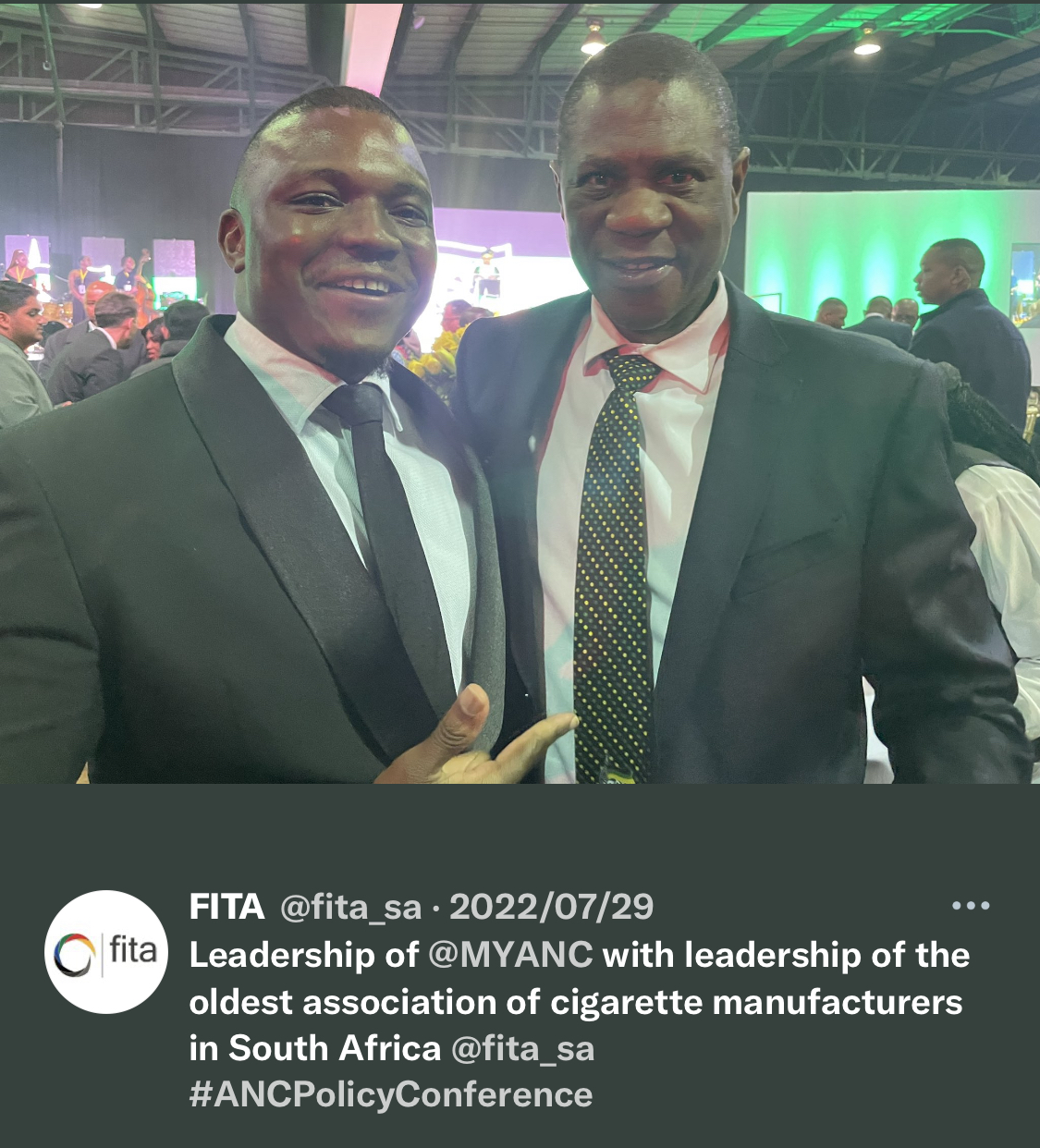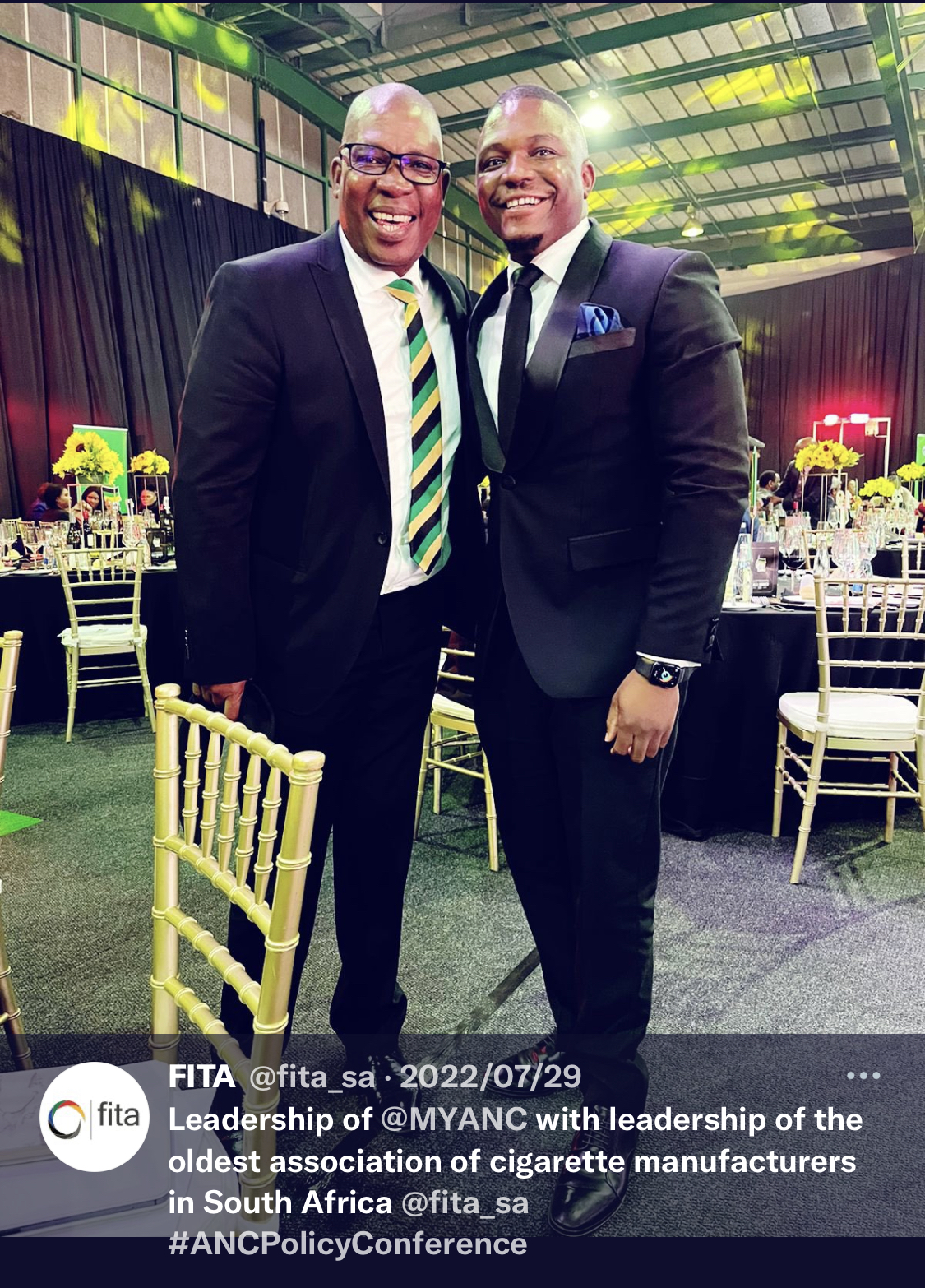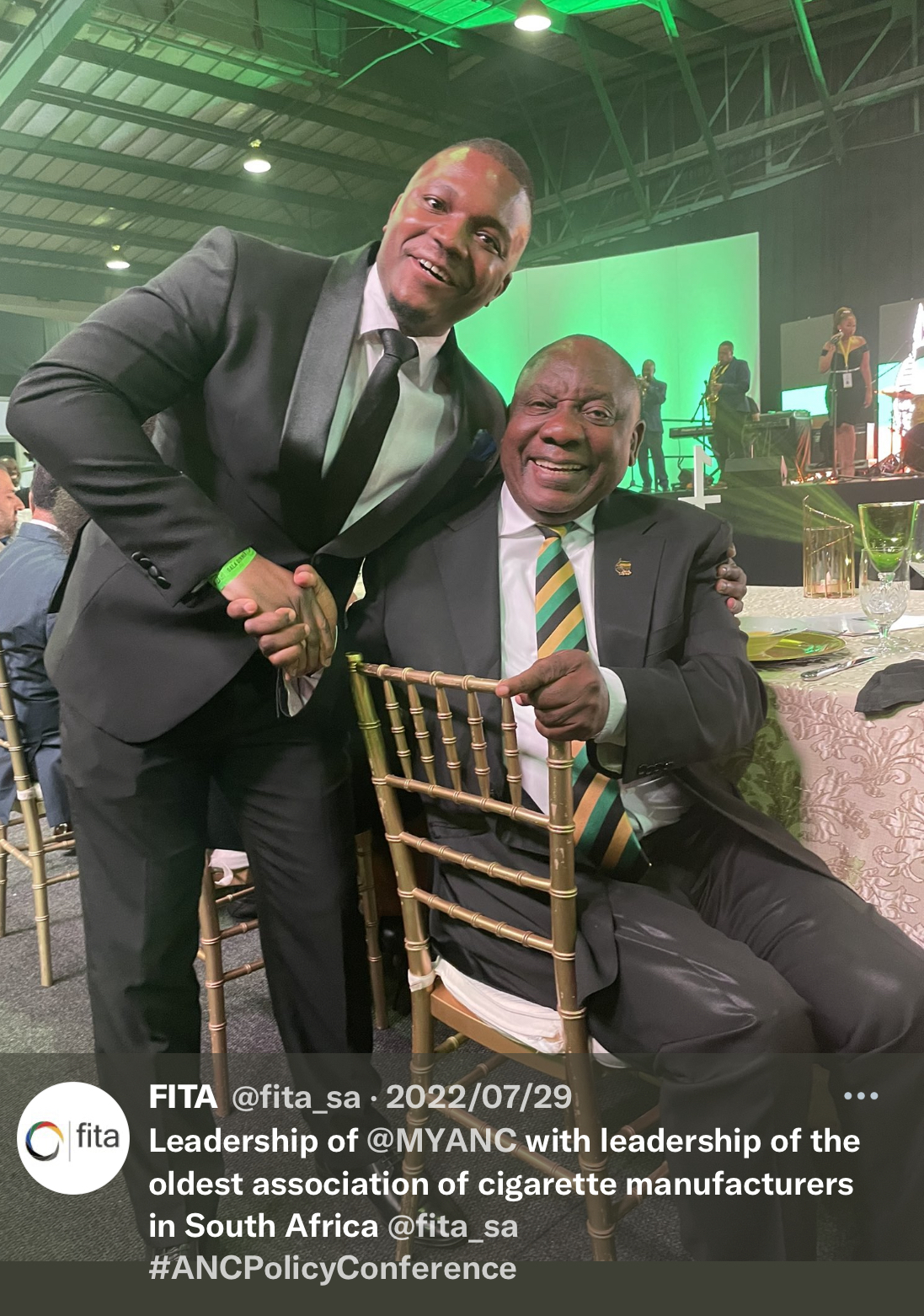There’s a striking difference between the government’s current attitude towards legal and illegal cigarette manufacturers — one which raises serious questions about government’s commitment to acting against those who pose very real threats to consumers, the legal tobacco value chain, and the national fiscus.
The contrasts have clearly shown up in two events over the past month.
Event number one was a fund-raiser for the African National Congress organised alongside its policy conference in late July. Pictures posted on social media by the Fair Trade Independent Tobacco Association (Fita) show the association’s representatives posing proudly with ANC leaders such as Panyaza Lesufi (the ANC’s Gauteng chairperson and the province’s MEC for Education, with responsibility for school-going children); Treasurer-General Paul Mashatile, responsible for the movement’s fund-raising; and the President himself, Cyril Ramaphosa, who is the head of state.
Granted, this was not a government event — but it was convened by the governing party, through the Progressive Business Forum, which presumably has a very strong mandate from the governing party.
So what signal does this photo opportunity send to the people of South Africa?
Without being melodramatic, it shows a deeply concerning proximity to government by an organisation whose members are effectively the champions of South Africa’s illicit tobacco trade.
Fita’s members include, at various points in its history, Carnilinx, Folha Manufacturers, Home of Cut Rag, and East London-based Protabac (recently closed by SARS for a lengthy period for non-compliance with regulations on the use of production counters).
Some of the manufacturers’ names mentioned may not be familiar to many South Africans. But for those of us involved in the legal tobacco trade — in other words, those who pay excise and tax to the government — know that their products now make up more than 70% of the cigarettes sold in South Africa today.
How do we know? It’s all in the price point.
According to existing tariff codes and regulations, manufacturers must pay R19.82 in excise for every pack of 20 cigarettes sold, and requisite VAT — making the total due to SARS from each pack of 20 at least R22.79. And that’s just the excise and tax costs — it excludes the manufacturer’s margin and all costs related to production, leaf, material, supply chain, retail and wholesale margins.
Anything sold below a price point of R27 can, therefore, be regarded as being an illicit product. And that’s precisely the space in which Fita members operate.
Recent research by Ipsos (Cigarette Retail & Wholesale Price Research Wave 5: 28 March 2022) shows that Fita member companies are at the heart of the illicit sector: “Shasha (owned by or licensed to Carnilinx), Sahawi (owned by or licensed to GLTC), VIP International (owned by or licensed to Carnilinx) and Savannah (owned by or licensed to GLTC) have a high incidence of purchases at R22.79 and below, with Shasha at 54.2%, Sahawi at 34.5%, VIP International at 45.5% and Savannah at 60.8% of brands manufactured in South Africa.”
The Ipsos research in question — published in April this year — is based on surveys of 151,000 retail outlets in South Africa. It is the most comprehensive and authoritative source of knowledge about who is selling what, and where — and it shows that the illicit market continues to just grow and grow and grow.
That growth was significant even before the Covid-19 lockdown ban on the sale of cigarettes. But it entered a boom period when consumers were forced to go underground and rely on backdoor — aka illicit — cigarettes. And although the lockdown ban is long over, the stranglehold of the illicit sector has remained in place — to such an extent that our member organisations describe it as “a national emergency”.
So, do the ANC leaders who happily posed for photos with the leadership of Fita know that they are effectively embracing the leadership of an organised tax-dodging network? If they don’t, they certainly should — particularly given how government appears to be so concerned about tobacco products that it wants to amend the legislation governing their sale.
This brings us to event number two: the recent release of the findings from the South African Medical Research Council’s global adult tobacco survey, at a panel discussion including representatives from the Department of Health.
The recommendations for change that have been put forward by the Department of Health to address changing smoking patterns appear to have been developed in complete isolation of the current market and economic realities. And their proposals are likely to only reinforce the size of the economic playground the illicit sector has built for itself, rather than inhibiting it.
Among other things, the Health Department now proposes plain packaging on all cigarettes sold, and a ban on point-of-sale advertising.
You don’t have to be a marketing graduate to realise the impact this will have on the grey products that are already being sold at retail outlets around the country. Globally, plain packaging has been found to make little difference to levels of smoking. In many cases, it has actually facilitated illicit trade and increased cigarette use among minors, and there is a growing school of opinion that it just does not work.
So why, at a time when we need all hands on deck to combat the illicit sector, is government focused on those who go about their work legally? Why put in place even stricter regulations on a sector that — unlike the illicit criminals — contributes more than R13-billion a year to the national fiscus, and follows all the laws and prescripts to the letter?
A smoke-free society will remain a pipe dream, if you’ll excuse the pun, if attempts to bring it about simply result in more and more people smoking illicit products.
In our view, government is fighting the wrong battle, with the wrong people. Instead of tightening the net around those who farm, process, manufacture and sell legally compliant products, it should be tightening the net on those who operate outside the law.
As the South Africa Tobacco Transformation Alliance (Satta), we have been heartened in recent months by a clear step-up by law enforcement authorities against some of the Fita members who continue to act illegally. There have been some significant raids and notable confiscations, and we appreciate that.
But it is a war out there — just ask any member of Satta, who sees the size of the market shrink, month after month after month.
In particular, ask the emerging black tobacco farmers who have ticked every legal box imaginable in their quest to produce legally compliant tobacco products. Struggling with small pockets of land, with no assistance from the state — despite the state’s insistence on rural reform, rural economic development, and black economic development — they are going out of business, one by one, as the size of the legal tobacco market shrinks.
They are at the starting point of the value chain, and any decrease in retail sales burns backwards — legal manufacturers are selling less so they make fewer cigarettes, decreasing the demand for processed tobacco leaf, thereby decreasing demand among those who farm tobacco.
More than 100 black tobacco farmers have already left the industry, and as Satta we have been forced to find new ways in which the remaining handful can earn a living. Some are considering farming alternative crops; others are hoping to ride the wave of the emerging cannabis industry.
Wherever we can, we are working with provincial governments to secure the future of the industry, and of black tobacco farmers in particular. We have had a particularly good response from Mpumalanga and the Eastern Cape, where there is a genuine concern about the sector that sometimes seems to contradict what we experience at national level.
The leadership in these provinces is keen to involve its provincial economic development agencies in finding ways that will ensure a future — any future — for those who are being dislodged by the rampant growth of the illicit sector.
This may be because the provincial governments are closer to “the people” than national government and recognise economic suffering when they see it — and are therefore more focused on stimulating legitimate economic activity that benefits black rural farmers in particular. Either way, it is encouraging.
But it is a race against time. The legal tobacco market is shrinking rapidly, caught between the twin pincers of a rapidly growing illicit sector and a rapidly shrinking retail space.
The road ahead is increasingly challenging for the people at the centre of South Africa’s 120-year-old legal tobacco industry. The contradictions in government’s posture are there for all to see.
Who knows where and when it will end — and what will be said about the role of government when it is time to write the industry’s obituary? DM




















 Become an Insider
Become an Insider
Oh the irony! The “legal” tobacco industry doth protest too much, given their suppression and lies around the health effects of their product. However, there is a point. They pay taxes to the government. The “illegal “ guys probably pay directly to the ANC and a much smaller amount
@ Sam Shu, the article is not about health effects so that part of your comment is irrelevant.
The ANC don’t pay their taxes either. Birds of a feather flock together: unscrupulous, dishonest and brazen.
To me it is obvious, or am I missing something?
Illegal activities = illegal money = money laundering = “clean” cash = BIG donations for the ANC and their crooked cadres! Untraceable, undeclared and everybody is happy.
Why would they kill their golden goose? Why else did they ban tobacco sales during lockdown?
I was amazed at how easy it was to buy illicit cigarettes (and alcohol) during lockdown.
There will always be a market amongst the poor for contraband cigarettes and alcohol beverages when massive excise taxes artificially push up the price of these goods. High taxes effectively exclude the poor from the legal product market, while those is the wealthier sectors of the community are able to pay for those legal products. The enormous profits available in the illegal sector corrupt the police, criminal justice system and politicians. The solution is obvious.
The gangsters and the ANC are indistinguishable from each other. “You are judged by the company you keep”
June 22. “South Africa’s Supreme Court of Appeal ruled this week that the government was wrong to ban the sale of cigarettes at the start of the nationwide hard lockdown in March 2020. The court found that there was no scientific justification for the continued ban on the sale of tobacco products.” Isn’t this why the pictures show a big thank you to the ANC from the illegal suppliers. Only picture missing is NDZ.